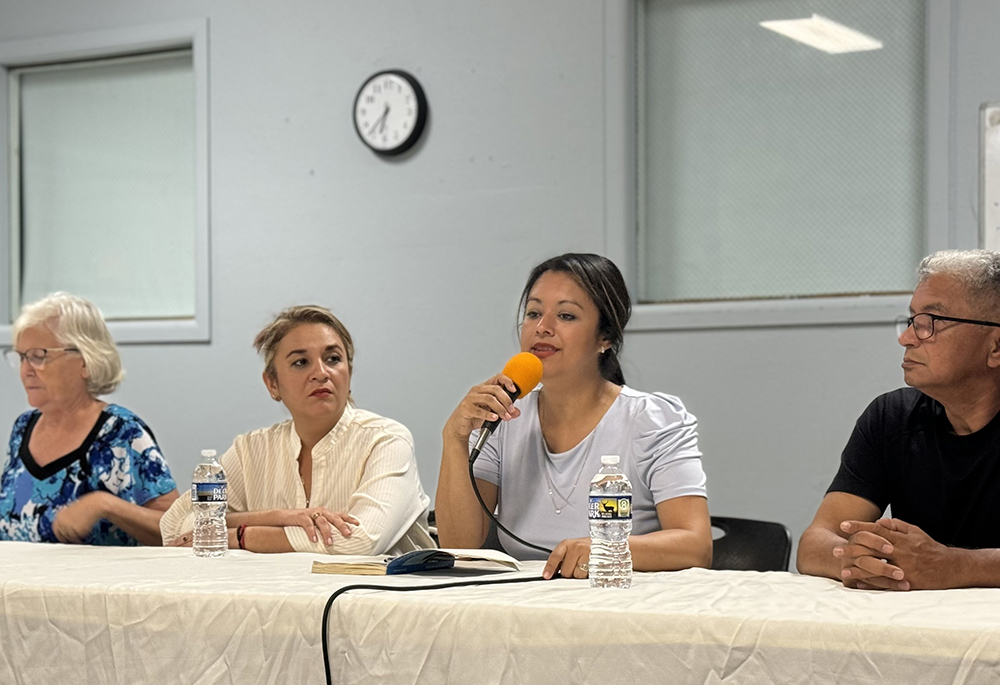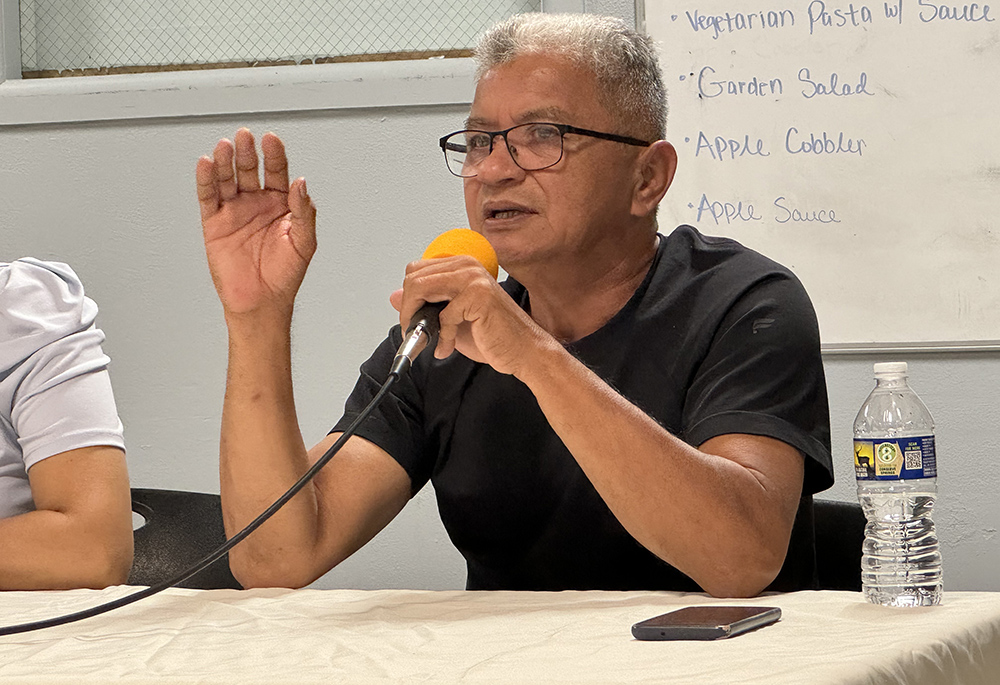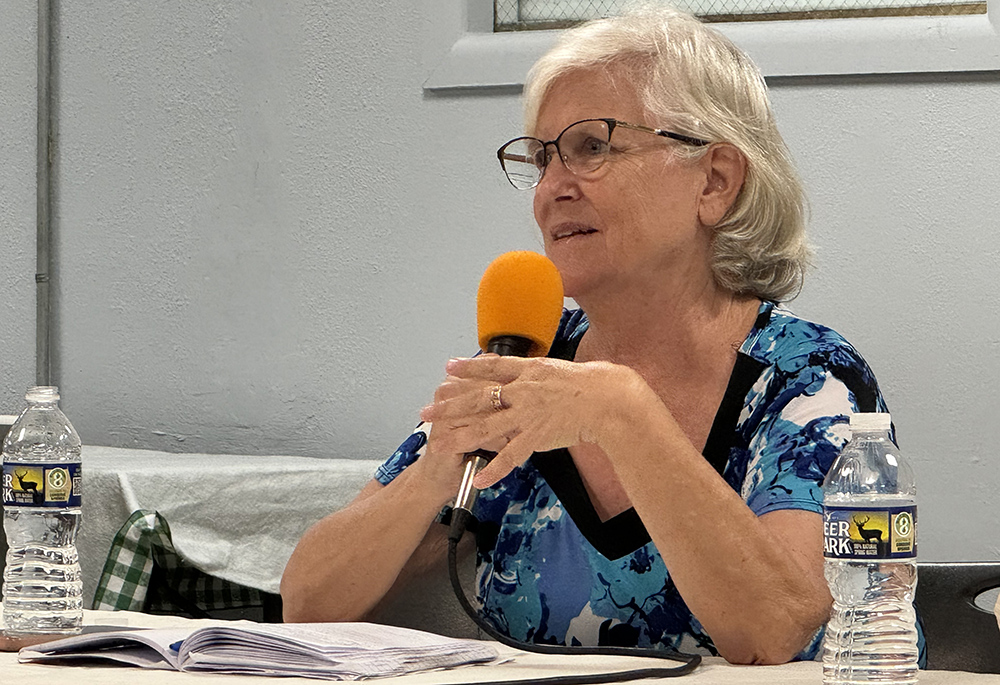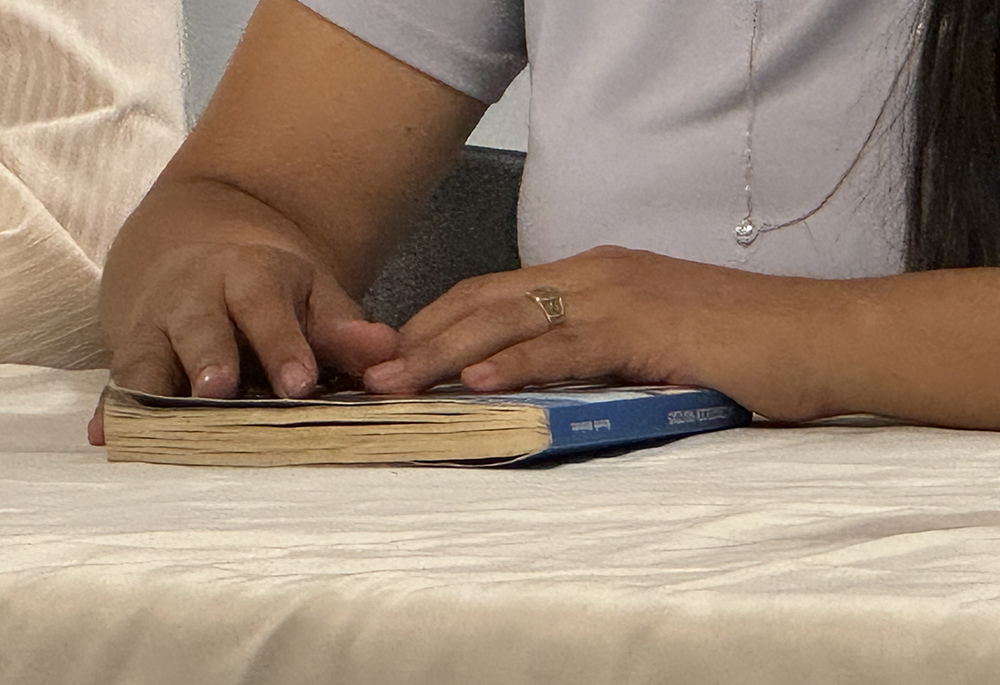
Three human rights lawyers from El Salvador, along with a member of Center for Exchange and Solidarity in El Salvador, left, addressed wrongful detentions in their country during a community event June 5 at St. Stephen and the Incarnation Episcopal Church in Washington. They talked about how the government’s "state of exception" has resulted in wrongful incarcerations and sometimes death for those detained. (NCR photo/Rhina Guidos)
A group of Salvadoran lawyers in Washington denounced human rights violations in their country and said their local diocese, once headed by St. Óscar Romero, has turned a "deaf" ear to the cries of the innocent in light of mass detentions that the government recently said number close to 80,000.
"The Catholic Church is deaf and silent. The evangelical church is worse. We've been abandoned by everyone," lawyer Ingrid Escobar told National Catholic Reporter following a press conference in Washington.
In a June 4-7 visit to the nation's capital that also included a stop in New York, Escobar, director of Socorro Jurídico Humanitario (Humanitarian Legal Aid), along with lawyers Jayme Magaña and Orlando Alferez, and Leslie Schuld, director and co-founder of Center for Exchange and Solidarity in El Salvador, known as CIS, shared stories of innocent individuals, communities as well as U.S. citizens who were visiting El Salvador and were detained under the government's "state of exception."
The government's measures, implemented in March 2022, suspend certain rights in the country, including the right to legal representation for anyone detained, saying it is necessary to combat gangs.
"It's true, gangs are enemies of the Salvadoran people and they have killed some of the best people ever born in El Salvador and it's necessary to continue fighting them," said Alferez during a June 5 event in Washington hosted by the Committee in Solidarity with the People of El Salvador. "But we're not here to defend the guilty. We don't defend, nor protect gangs … that's not what we do. We're defending people who have unjustly become victims of the [state of exception]."

Orlando Alferez, a lawyer with El Salvador’s Socorro Jurídico Humanitario talks about human rights violations in his country, June 5 in Washington. Gang members have destroyed his country and they deserved to be dealt with, he said, but his group is trying to defend those wrongly detained during the government’s crackdown. (NCR photo/Rhina Guidos)
Among those the nonprofit lawyers' group is trying to defend is a client accused of "illicit affiliations" when he was 4, said Magaña.
"I had to request records from his kindergarten," she said.
Another client, who was detained for wearing a cap with the initials of Italian brand MSGM, was also accused of illicit affiliations after authorities said the letters on the cap confirmed his association with the MS-13 gang because of the first two letters, Alfarez said.
Schuld said CIS, based in El Salvador and formed by solidarity groups from the U.S., Canada and Europe to accompany Salvadoran communities, got involved in the defense of those accused after the organization's Spanish teacher on the island of Espíritu Santo was detained. A spate of detentions followed on Espíritu Santo, which has never had a gang problem. At least 25 have been arrested on the island, including a teen with a rose tattoo, honoring his mother named Rosa, as well as a couple suspected of being detained because they are lesbians, Schuld said.
While the islanders successfully defended themselves from gangs, requiring visitors to hand over identification before entering the community, many "now are in prisons, victims of the government," Schuld said.
El Salvador's Vice President Félix Ulloa told The Associated Press in January that the government had released some 7,000 from detention centers, admitting that it "made mistakes," saying some innocent people have been jailed. But Schuld maintains that while some were released, many were recaptured because they spoke out about the disease, lack of food and bad hygiene in the detention centers, having to use one toilet for 150 people, four people to one bed, while those who couldn't find a spot on a bed had to sleep on floors dirtied by feces.

Leslie Schuld, director and co-founder of the Center for Exchange and Solidarity, spoke June 5 in Washington about helping a small community on the island of Espíritu Santo, El Salvador, after a spate of arrests. The isolated community had largely avoided gang problems, she said, but they have been affected by random arrests by the government under its "state of exception." (NCR photo/Rhina Guidos)
Yet the government periodically shows off for media its mega-prison where "proven gang members" eat three meals a day, each one has his own bed, medicine and even a gym, Schuld said. That's not the same experience others are receiving and it looks as if the government has made a deal with gangs to treat them better, she said.
The group presented their concerns to U.S. lawmakers and organizations, including the United Nations and U.S. State Department, citing violations of international law. They also sought to tell Salvadorans living in the U.S. about the plight of those perishing in El Salvador's prisons, but also to warn them to be careful about what they wear, to cover tattoos, even if they have nothing to do with gangs, when they visit the country.
In March, two Salvadoran men with U.S. citizenship went missing while they were visiting the country. One was last seen with police and soldiers, and authorities notified the family days later that his body had been found and they had cremated it, saying he had committed suicide. The second man has not been located.
Escobar told NCR citizens of Colombia, Guatemala, Venezuela and Nicaragua also have been arrested under the measures and two died in government detention, along with more than 200 Salvadorans whom she believes were innocent. It only takes a phone call to the government from someone who doesn't like you to end up in prison, she warned.

Ingrid Escobar, director of El Salvador’s Socorro Jurídico Humanitario holds her country’s constitution while addressing human rights violations in the nation, during an event June 5 in Washington. She warned Salvadorans and others visiting the country about the government’s random detentions which have resulted in imprisonment and sometimes death, she said. (NCR photo/Rhina Guidos)
Lilo Gonzalez, a Salvadoran Catholic who fled in the 1980s to the U.S. during the country's war, was one of the 40 or so who attended the June 5 presentation in Washington. He listened intently to a woman in the room who said her brother was unjustly detained and it cost him his life. Gonzalez also listened to Manuel Gomez, a 2019 supporter of Nayib Bukele, whose government instituted the measures.
Initially, he was happy with them because he was tired of dealing with gangs. But he never imagined his brother would become a victim of them, detained when he wasn't able to give police $300 cash they were asking for, he said.
Bukele was sworn in for a second time June 1, even though the country's constitution forbids consecutive reelection of a president. His party also holds a majority needed for the state of exception, which was supposed to last 30 days, to stay in place. The expectation is that the measures will stay in place as long as Bukele maintains power.
Gomez said he is scared of his government, seeing so many innocent people randomly detained. After what happened to his brother, he made a decision to leave the country and now is in the U.S. seeking protection.
Advertisement
Gonzalez said he, too, was scared when he recently visited his home country, the first time he's had that sensation since the war.
"And I haven't done anything," he told NCR.
Gonzalez said it's "tragic" to see "that we're returning to where we were in the 1970s, 1980s," a time devoid of rights in El Salvador, but this time with consent by the public and by some in the church. He said he was upset, as others were, seeing the current archbishop of San Salvador, José Luis Escobar Alas, who has faced fierce backlash after participating in Bukele's second swearing-in ceremony, blessing and praying during a public act that violates the constitution.
He said he thought of the children facing the absence of their parents, of those born in prison, but also what awaits the poorest and defenseless in his homeland. He said he would ask Archbishop Escobar and other Salvadoran prelates who attended the ceremony to look to their conscience and to ask St. Romero to enlighten them to be with the poor.
"To the leaders of the church, I'll ask that they listen to the voice of Monseñor Romero and to look at what the government is doing in practice. For me, it's not a question of left and right. Any government that's a good government must look out for the poor: that's the preferential option of the poor of Monseñor Romero. It's not a slogan," he told NCR.








